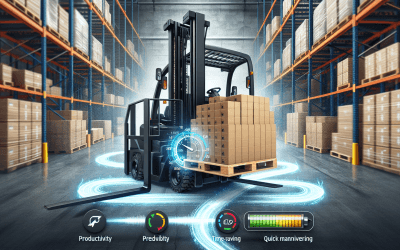In the fast-paced world of warehouse operations, efficiency is key. The ability to maximize...
Optimize forklift power usage for energy savings and uptime.
Forklift Fleet Power Management
People – Equipment – Workflow

Forklift fleet power management is a service that helps facilities reduce energy waste, extend battery life, and optimize forklift charging practices. It’s ideal for warehouse managers, sustainability coordinators, and operations leaders managing electric forklift fleets.
We assess how your fleet uses power and recommend smarter charging schedules and battery maintenance programs that lower costs and boost performance. Our evaluations focus on:
- Battery charging patterns and station usage
- Power consumption tracking and load balancing
- Battery health, replacement schedules, and maintenance
- Energy-efficient charging infrastructure recommendations
- Best practices for operator charging behavior
This service ensures your electric fleet runs longer, charges smarter, and operates with fewer interruptions.
Electric Forklift Power Management for Cost and Efficiency Gains
Monitor Energy Consumption
Improve Battery Health
Optimize Charging Schedules
Learn More From Our Blog
How to Optimize Forklift Power for Maximum Uptime
When it comes to warehouse operations, optimizing forklift power is crucial for maintaining...
The Benefits of Forklift Power Standardization
Warehouse optimization is a critical aspect of any business that relies on efficient supply chain...
The Impact of Forklift Power on Maintenance Costs
In the world of warehouse operations, forklifts play a crucial role in ensuring smooth and...
The Benefits of Forklift Power Flexibility
When it comes to warehouse operations, efficiency and productivity are key factors that can...
How to Safely Transport Forklift Batteries
Transporting forklift batteries safely is crucial to ensure the smooth operation of warehouse...
Why Choose HCO Innovations for Forklift Fleet Power Management?
HCO Innovations understands the impact power usage has on your fleet’s reliability and your facility’s energy budget. We bring deep experience in electric forklift operations, helping you implement battery strategies that extend equipment life and reduce utility costs. From data collection to actionable planning, we manage the details so you don’t have to.
- Energy audits tailored to electric forklift operations
- Battery health tracking and performance reporting
- Charging station usage analysis and optimization
- Cost reduction through smarter charging practices
- Sustainability insights and support for green initiatives
Whether you’re operating a small electric fleet or managing multiple facilities, we help you charge smarter and operate cleaner.








